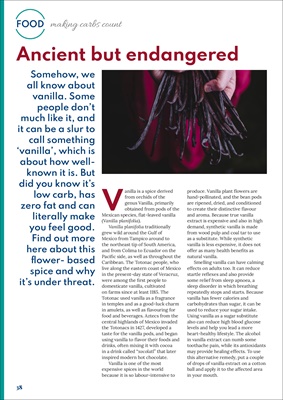
38
FOOD making carbs count
Ancient but endangered
Somehow, we
all know about
vanilla. Some
people don't
much like it, and
it can be a slur to
call something
'vanilla', which is
about how wellknown
it is. But
did you know it's
low carb, has
zero fat and can
literally make
you feel good.
Find out more
here about this
flower- based
spice and why
it's under threat. Vanilla is a spice derived
from orchids of the
genus Vanilla, primarily
obtained from pods of the
Mexican species, flat-leaved vanilla
(Vanilla planifolia).
Vanilla planifolia traditionally
grew wild around the Gulf of
Mexico from Tampico around to
the northeast tip of South America,
and from Colima to Ecuador on the
Pacific side, as well as throughout the
Caribbean. The Totonac people, who
live along the eastern coast of Mexico
in the present-day state of Veracruz,
were among the first people to
domesticate vanilla, cultivated
on farms since at least 1185. The
Totonac used vanilla as a fragrance
in temples and as a good-luck charm
in amulets, as well as flavouring for
food and beverages. Aztecs from the
central highlands of Mexico invaded
the Totonacs in 1427, developed a
taste for the vanilla pods, and began
using vanilla to flavor their foods and
drinks, often mixing it with cocoa
in a drink called "xocolatl" that later
inspired modern hot chocolate.
Vanilla is one of the most
expensive spices in the world
because it is so labour-intensive to
produce. Vanilla plant flowers are
hand-pollinated, and the bean pods
are ripened, dried, and conditioned
to create their distinctive flavour
and aroma. Because true vanilla
extract is expensive and also in high
demand, synthetic vanilla is made
from wood pulp and coal tar to use
as a substitute. While synthetic
vanilla is less expensive, it does not
offer as many health benefits as
natural vanilla.
Smelling vanilla can have calming
effects on adults too. It can reduce
startle reflexes and also provide
some relief from sleep apnoea, a
sleep disorder in which breathing
repeatedly stops and starts. Because
vanilla has fewer calories and
carbohydrates than sugar, it can be
used to reduce your sugar intake.
Using vanilla as a sugar substitute
also can reduce high blood glucose
levels and help you lead a more
heart-healthy lifestyle. The alcohol
in vanilla extract can numb some
toothache pain, while its antioxidants
may provide healing effects. To use
this alternative remedy, put a couple
of drops of vanilla extract on a cotton
ball and apply it to the affected area
in your mouth.